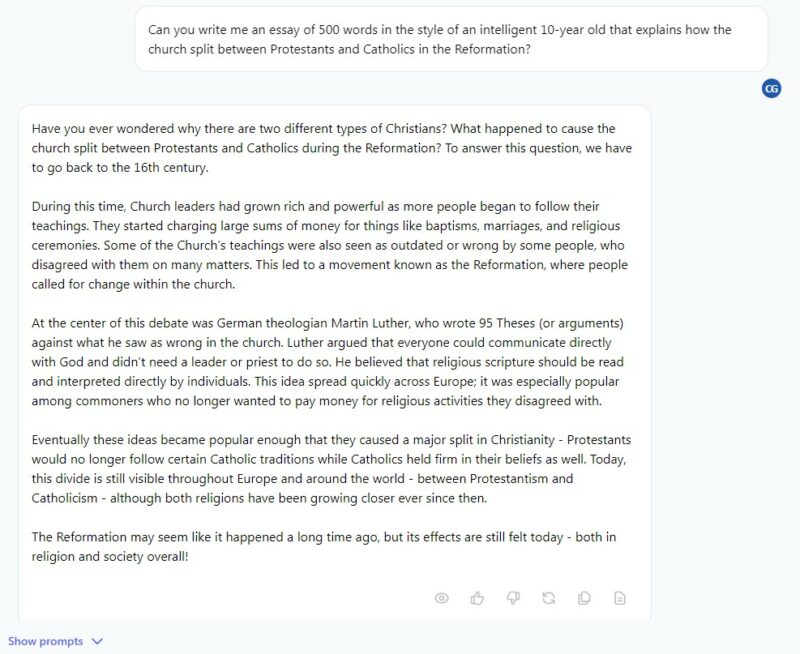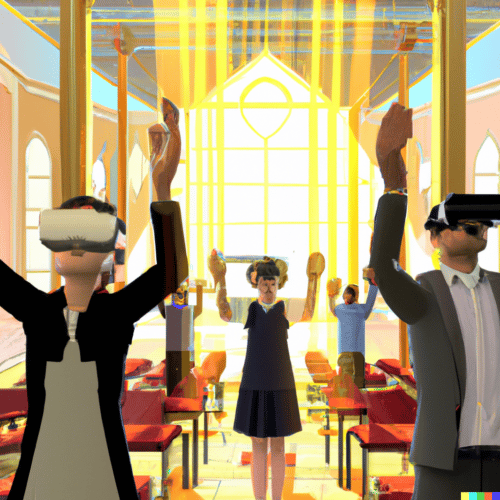What technology trends will impact your life in 2023?
Technological advances continue at a breath-taking speed, it can be hard to keep up, much less work out how they affect our everyday life or faith. Chris Goswami explains more

What is just a passing fad and what might fundamentally change life as we know it? What is to be embraced, and what should we be concerned about?
Here’s my guide to the biggest tech trends and how they affect Christians and the Church:
Do you know who you’re talking to? … it might be an AI-bot
Most of us have come across “chatbots” on websites that try to help us with questions like “how do I return this item?”. (They often annoy us as we would rather speak with a human).
In recent years, much more advanced chatbots have emerged. These can, for example, converse meaningfully with elderly residents in a care-home. They can initiate conversation, play games, and even detect the resident’s mood swings and adapt their speech to suit. There are ethical debates here, but with ageing populations and a lack of social care funding, this trend won’t go away just because we’re uncomfortable.
But last December, the world of Artificial Intelligence (AI) chatbots took a huge leap forward. Chat GPT is AI software which can create convincing and sophisticated text on demand, including poems, short stories or an article like this one.
Here’s a short essay I requested from an AI-bot called Jasper that uses the same, “GPT”, natural language model as GPT Chat:

An original essay produced by AI
I then asked for the same essay in the style of an 18-year old and a more sophisticated essay came back – very impressive! There is scope here for a new kind of plagiarism eg “please write my homework essay” or even “write me a story in the style of J. K. Rowling”… you get the idea.
Note that this type of information is not “stored”, ie nobody typed in the essay. Instead, the AI-bot researched thousands of articles on the internet and created this unique, original article – all within seconds. It’s mind-blowing. This is “machine learning”, where bots learn, as we do, by looking at examples and continuously improving themselves. But, unlike us, they are designed to know no limits.
They can also be quite persuasive – for example, the evangelistic robot “who is Jesus?” brought 150 non-believers to faith, AND connected them with local churches.
Having said all that, when I typed, “please write my sermon on encouraging one another, based on 1 Thessalonians 5, v11”, what came back was poor … but it still wrote one – AND, it will continuously improve (unlike my preaching !)
Looking ahead
AI generated ads, articles, stories, and even works of art will increasingly appear in our work, home, and church environments. There is scope for tremendous benefits as well as scams and plagiarism. All this begs the question: In 2023, how will we tell man from machine?
House prices will soar in 2023 …. Welcome to the metaverse!
Have you heard of the metaverse? If not, don’t worry, most of it’s hype. But some of it isn’t.
The metaverse doesn’t have a single definition, but, if you think of the internet as something we look at, the metaverse is a version of the internet that we are inside.
Wait! How do you go inside the internet?
Armed with a Virtual Reality (VR) headset, you can wander around this virtual world as if you were there, and you can meet others via their “avatar” – an animated character they have designed to represent themselves. You can socialise, play games, watch a concert and even attend a church service. VR-Church is one church that only offers services and meetings to people wearing these headsets.
And inside this virtual space, a land-grab is taking place. Gucci, Adidas Nike and many others are investing millions in plots within these virtual worlds– in the same way they would seek prime locations in the physical world. Even private individuals are buying plots and setting up eg an art gallery. And it’s sending prices of virtual plots sky-high.
Kids are already engaging in an early version of the Metaverse. Video games including Fortnite, Roblox, and Minecraft already offer an immersive experience. These don’t require headsets – they provide the Illusion of 3D on a regular screen — and they are expanding to virtual arenas that offer musical festivals and events.

This is an original image auto-generated by AI, based on text in this article
Looking ahead
Online ministry is here to stay and is breaking new ground. A few churches have already started to offer a metaverse service for people who can’t or won’t attend in person. This area is still immature, most of what we hear this year will be hype. But 2024/25 will be different.
Crypto-currencies have collapsed – but what happens next is key
In 2022 the world of Bitcoins, and “crypto-currencies” came crashing down. Bitcoin, lost 60% of its value, and several organisations linked to crypto-currencies declared bankruptcy. So, is the end of Bitcoins and crypto-currencies?
Absolutely not.
Emerging technology markets are subject to extreme instability you just don’t get in traditional markets like the food industry or construction, but they also offer huge growth potential. Take the dotcom bust: Even Amazon lost over 90 per cent of its share value in 2001 when the market collapsed, but those companies that survived 2001 have soared in value.
Crypto-currency is another highly volatile tech market and would-be investors need nerves of steel. But, as well as that, any Christian considering investing needs to consider the ethics.
One of the main arguments levelled against Bitcoin is that it wastes shocking amounts of energy. The electricity required to power the thousands of computers performing calculations as they search for Bitcoins worldwide, exceeds the energy consumption of Sweden for example.
And there are ethical arguments in the opposite direction. For example, Bitcoin can enable people with no bank account (most people in developing countries) to send money home. And here in the west, Bitcoin can empower young people who may never own their own home and have no realistic pension to look forward to, unlike many in older generations. 90% of Bitcoins in the world are owned by Gen-Z and Millennials (aged 18–40).

This is an original image auto-generated by AI, based on text in this article
Looking ahead
Hundreds of millions of people have invested in Bitcoin (and other crypto-currencies). Moreover, the underlying technology on which this is based – a distributed system of online ledgers that track transactions — is being deployed in areas outside crypto-currencies.
It’s a roller coaster, but crypto-currencies haven’t gone away.
Space exploration is back in the news
In 2022, hardly a week passed without some announcement on a space-related topic. Sometimes these were events like shooting stars or the Northern Lights. But other announcements were about new missions planning to return to the moon, or bringing back rocks from Mars, or the astonishing photographs from a brand new telescope sent into space, the James Webb Space Telescope.
What’s so good about a nerdy new telescope?
This telescope is so powerful it is sending back beautiful photographs of galaxies never before seen, more distant and more ancient than we could have imagined. Each galaxy contains billions of stars and an incalculable number of planets, any number of which may harbour new unimagined civilisations.
What would it mean for Christians if it turned out that there was intelligent life elsewhere?
In fact, it makes no difference as neither the Bible nor Christian tradition says anything about life on other planets. Similarly, as astronomy throws new light on how and when our universe was created this also does not change the Christian view of creation. As Christian astronomer Prof Deb Haarsma has said, “science and the book of Genesis are two complimentary pictures, and you need them together to understand what God was doing with creation. Science answers the questions of how and when, but only scripture can show us who and why”

The Carina Nebula is 7,500 lightyears away. Each “peak” you see is 6 or 7 light-years high and a light-year is approx 10 trillion km
Looking ahead
Watch the space war unfolding between billionaires Jeff Bezos, Richard Branson, and (no surprise!) Elon Musk. Each is developing services, launching satellites, and promoting space tourism. This race is on!
But more importantly, sit back and enjoy the new photographs from deep space as James Webb gazes ever further into the darkness. They will be astoundingly beautiful, they will continue to make headlines, and they point us to the glory of God!
A last word from Jasper
Finally, to end this article, I asked Jasper to write a short poem on the pitfalls of technology for Christians. Here’s what came back in three seconds:
The pursuit of knowledge is a laudable aim,
But can tempt us away from Jesus’s name.
It’s important to remember amidst all these trends,
God’s love is everlasting and His word never ends.
Well … I couldn’t have said it better!
Top image | Aakash Dhage | Unsplash
NASA's James Webb Space Telescope | Flickr | Creative Commons
Chris Goswami is Associate Minister at Lymm Baptist Church. He regularly writes for Premier Christianity and is the author of www.7minutes.net, where this reflection previously appeared. It is republished with permission.
Do you have a view? Share your thoughts via our letters' page.
Baptist Times, 30/01/2023